A large book that Press Secretary Kayleigh McEnany told “60 Minutes” host Lesley Stahl had contained President Donald Trump’s health care plan for his second term was, in fact, devoid of any such content.
In a tweet from last week, McEnany touted the book she had handed Stahl after Trump had abruptly ended his pre-recorded interview with the veteran journalist over being upset about having to answer “tough questions” during their segment together.
McEnany described the book as being “just a small part of what President @realDonaldTrump has done for healthcare in the United States.”
“She couldn’t believe how HUGE it was,” McEnany added in the tweet, “and said, ‘I can hardly lift this!!'”
Handing Lesley Stahl just a small part of what President @realDonaldTrump has done for healthcare in the United States.
She couldn’t believe how HUGE it was and said, “I can hardly lift this‼️” pic.twitter.com/RSWrzKo1or
— Kayleigh McEnany 45 Archived (@PressSec45) October 20, 2020
“Oh my God, this is his health care plan?” Stahl asked in the segment, which CBS aired on Sunday night.
“Yes,” McEnany replied.
In a voiceover, however, Stahl explained that the contents of the document McEnany had given her did not include Trump’s long-promised health care plan.
“It was filled with executive orders and congressional initiatives,” Stahl said, “but no comprehensive health care plan.”
President Trump’s press secretary, Kayleigh McEnany, gave us a heavy book that she described as the president’s health care plan. It was filled with executive orders and congressional initiatives, but no comprehensive healthcare plan. https://t.co/Mn6HRAOwHL pic.twitter.com/WmsoRQP2WJ
— 60 Minutes (@60Minutes) October 26, 2020
The book included 13 executive orders signed by the president, as well as “other pieces of health-care legislation enacted under Trump,” according to Rob Crilly of the Washington Examiner, who was granted access to the document before the “60 Minutes” interview aired.
The legislation, however, wasn’t directly related to any real health care plan — it included, for instance, Trump’s 2017 tax act, which merely zeroed out the Affordable Care Act’s (ACA) tax mandate.
Many have questioned the president on plans for health care, especially since there’s a strong likelihood that the Supreme Court may in the near future rule the ACA unconstitutional. If that happens, millions of Americans will be dropped from insurance plans available through the federal health exchange. Even those with insurance plans through their employers may be in trouble, as the court could also wipe out protections for individuals with preexisting health conditions.
Trump has promised at various times over the past several months to provide a health care plan, only to fail to meet his own deadlines. In July, he said he would sign “a health care plan within two weeks.” After that deadline passed, he said in August he’d be introducing a new plan “sometime, hopefully, prior to the end of the month.”
McEnany told reporters in September that Trump would unveil his plans for health care within “the next week or so,” but a plan never materialized.
The president has also been mum about prospective economic policy, with his campaign website only listing off supposed accomplishments rather than what policies he might implement if he’s reelected.
Press freedom is under attack
As Trump cracks down on political speech, independent media is increasingly necessary.
Truthout produces reporting you won’t see in the mainstream: journalism from the frontlines of global conflict, interviews with grassroots movement leaders, high-quality legal analysis and more.
Our work is possible thanks to reader support. Help Truthout catalyze change and social justice — make a tax-deductible monthly or one-time donation today.
